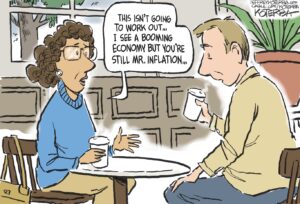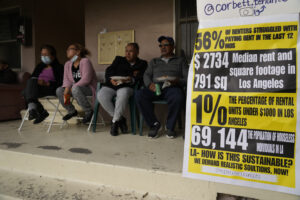One Year Later: Lessons Learned From Occupy Wall Street
Occupiers say the movement is about building connections, creating alternative media sources and learning to cope without government.
By Thomas Hedges, Center for Study of Responsive Law
Last week protesters disrupted traffic and picketed corporate headquarters in Washington, D.C., in honor of the Occupy Wall Street movement’s one-year anniversary. Roughly 130 people gathered at 7 a.m. Oct. 1 in Farragut Square and then marched along K Street, where many lobbying firms are located, chanting “all day, all week, occupy K Street” and clutching signs that read “Down With K Street” until reaching Liberty Plaza.
After breakfast and a string of discussions, the group left Liberty Plaza at 1:20 p.m. and marched toward McPherson Square, the birthplace of Occupy D.C.
The demonstrators stopped in front of corporate offices along the way, denouncing abuse toward taxpayers, consumers and the environment.
A young protester turned and addressed the group via mic check (echo rather than amplification) in front of Brookfield Properties, which manages Trinity Church property in New York City and refused to allow demonstrators to camp in Duarte Square after the Occupy Wall Street movement was evicted from Zuccotti Park last year.
The marchers also stopped at Pepco, reproaching the utility’s inflation of rates, and chanted “Bank of America, bad for America,” as they passed BofA.
Fifteen or so flashing police cars hugged the back of the group.
“Taking K Street is a rejection of the two-party system,” said Kathryn Seidewitz, 17, a student from the D.C. area.
Seidewitz, who is too young to vote, joined the movement last year and has found that going to the polls cannot stand on its own.
“Voting, punching a ballot every four years? That’s a sham after all of this. It’s a farce. By participating in it, it feels like you’re giving in. I’m not going to unequivocally say there’s no value [in voting]. But the reason this movement hasn’t participated in the process is because it’s much more about people, it’s much more about changing people’s lives and working within communities and working with each other and that’s not what the political process does. It alienates and plays into power, which does not benefit most people.”
The presidential campaigns illustrate for many protesters how the electoral process is rigged in favor of corporate interests.
“The issues that really affect working people, [Romney and Obama] agree on,” said Matt Kirkland, 28, a salesman from D.C. “They agree on NDAA [National Defense Authorization Act]. They agree on drones over the U.S. They agree on endless wars for profit. They both agree with SOPA [Stop Online Piracy Act] and PIPA [Protect IP Act]. Guantanamo’s not closed. And neither plan on closing it.”
Government has finally abandoned the public interest for good, Kirkland says. He sees little potential for taking it back.
It’s now “about building self-sufficient communities that can support themselves without the government,” he said. “It’s no longer political. It’s social.”
The Occupy movement, Kirkland says, teaches people how to cope with the absence of government. As social programs, school offerings and health and pension benefits get cut, working-class people will have to learn to take charge of their own communities.
Because of the movement, “they’ll be prepared for when there is no government to serve them,” he said.
Kirkland and Seidewitz do not agree with notions in the mainstream media that the Occupy Wall Street movement has died out.
“The parks were magical,” said Seidewitz, “but they served as a place where we all met each other.”
The encampments were educational. They helped people build connections and form social groups. But camping in a park and talking to like-minded people, she said, can only do so much.
“It’s now about creating alternative media sources, which is easier to do now that we have all these connections,” she said. “We’ve all woken up. So it’s not about a park anymore.”
Seidewitz is an editor and contributor for the online publication D.C. Mic Check. Although unsure of where Occupy Wall Street is headed, she is confident that the movement, which has receded from a physical space and found life on alternative news sites, is an auspice for the majority of the country that is quickly being left behind.
This article was made possible by the Center for Study of Responsive Law.
Your support matters…Independent journalism is under threat and overshadowed by heavily funded mainstream media.
You can help level the playing field. Become a member.
Your tax-deductible contribution keeps us digging beneath the headlines to give you thought-provoking, investigative reporting and analysis that unearths what's really happening- without compromise.
Give today to support our courageous, independent journalists.






You need to be a supporter to comment.
There are currently no responses to this article.
Be the first to respond.